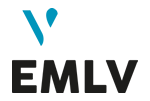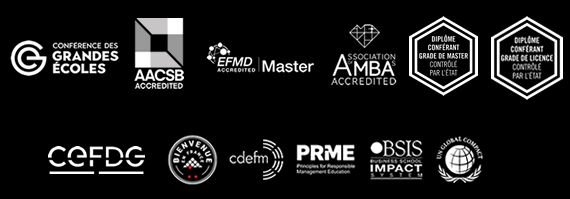Co-hosted by EMLV and ESILV at the Arche Campus in Paris La Défense, DIVE25 brought together researchers, engineers, and partners for a day of interdisciplinary exchange around immersive technologies and visual engineering.
This first edition forms part of a broader strategy to promote collaborative research at the intersection of management, engineering, and digital innovation. Designed as a platform for transversal dialogue, the DIVE25 workshop fostered knowledge sharing between institutions, disciplines, and research communities.
DIVE25: An Interdisciplinary Dialogue on Immersive Futures
The De Vinci Immersive Technologies & Visual Engineering Workshop – DIVE25 – marked a significant step in strengthening collaboration between the management and engineering faculties of De Vinci Higher Education.
Organized by the De Vinci Research Center, the De Vinci Immersive Lab, and the IVI Research Group (Immersion, Vision & Interaction), this event combined technical insight and critical reflection on emerging digital environments.
The programme included a series of expert talks, research presentations, and discussions covering a wide range of topics related to Human-Computer Interaction (HCI), Artificial Intelligence, Extended Reality (XR), and the societal implications of immersive environments.
DIVE25 is a strategic opportunity for EMLV: it strengthens interdisciplinarity, supports pedagogical innovation, and positions the school at the heart of research on responsible digital transformation, — Insaf Khelladi, Associate Professor, EMLV
EMLV’s Multi-Level Involvement in DIVE25
EMLV played an active role in DIVE25 at multiple levels. The event was co-organized by Insaf Khelladi, professor-researcher at EMLV, who also presented ongoing research on “Exploring Consumer Interactions in Mixed Reality: An Integrated Framework Approach,” conducted in collaboration with Saeedeh Vessal, Assistant Professor in Marketing at EMLV.
Elissar Toufaily shared insights from her research on Web3 environments through a talk titled “Centralized Castles or Decentralized Democracies? A Narrative of Two Metaverses.”
In addition, EMLV is an institutional partner of the Immersive Lab, alongside ESILV, Innopeda, IIM, and IFT—co-organizers and contributors to this cross-disciplinary initiative.
Highlights from the Programme
Keynote speaker Professor Simon Richir, professor at Arts et Métiers, opened the event with a talk titled “Metaverse is dead, Long live the Interverse!” setting the tone for an open and forward-thinking agenda. His intervention underscored the evolution of immersive spaces and the potential for new, interconnected paradigms.
Throughout the day, researchers from EMLV and ESILV explored various themes:
- Elissar Toufaily, professor-researcher at EMLV, examined governance in virtual worlds through the lens of decentralized versus centralized models.
- Xiao Xiao, professor-researcher at ESILV, presented ReMirrorFugue, a project that investigates emotional presence and asynchronous communication.
- Ahmed Azough, a professor-researcher at ESILV, showcased tools that combine AI and XR to analyze human-avatar interactions.
- Insaf Khelladi, professor-researcher at EMLV addressed consumer behavior and user engagement in mixed-reality retail experiences.
- Swaminath Venkateswaran, professor-researcher at ESILV, introduced a human-robot interaction platform to support operator well-being.
- Pierre Lefebvre, professor-researcher at ESILV, concluded the session with a presentation on research into violence detection systems that utilize thermal imaging and motion analysis.

Insaf Khelladi, Associate Professor at EMLV and co-organizer of the event.
A Collaborative Ecosystem for Research and Innovation
Led by Pascale Bueno Merino, Associate Dean for Research at EMLV, Francesco Salvarani, Director of Research at ESILV, and Nicolas Travers, Deputy Director of Research, the workshop demonstrated the synergy between the two schools.
Strengthening interdisciplinarity between ESILV and EMLV means creating a collaborative space for researchers in management and engineering sciences. This approach is a strategic focus of the De Vinci Research Center and contributes to increasing its visibility—along with that of the schools—among academic and industry partners, — said Insaf Khelladi, Associate Professor, EMLV
By bridging technical and managerial expertise, DIVE25 aims to shape a new research ecosystem that can respond to the complex challenges posed by immersive technologies and their real-world applications.
Beyond its academic contributions, the event fostered dialogue between theory and practice, combining applied research, academic exploration, and business relevance.

Elissar Toufaily, professor-researcher at EMLV, examined governance in virtual worlds through the lens of decentralized versus centralized models.
EMLV’s Research Strategy: Excellence, Impact, and Interdisciplinarity
EMLV’s research strategy is structured around four main development objectives: scientific excellence, societal impact, interdisciplinarity, and internationalization.
Scientific excellence is reflected in a growing number of publications in top-tier academic journals. In parallel, EMLV is committed to expanding the reach of its research through dissemination initiatives, including contributions to practice-oriented publications and science communication videos.
The school also undertakes contractual research, including research chairs and participation in European projects, to enhance the practical relevance and societal impact of its academic work.
Interdisciplinarity is a core principle of this approach. It is embodied in the structure of the De Vinci Research Center, where researchers in management and engineering sciences collaborate within shared teams.
This interdisciplinary framework promotes research that addresses significant societal challenges, particularly in areas such as ecological transition and e-health.
Toward Future Editions
DIVE25 is the first in a series of immersive workshops and events focused on cross-disciplinary collaboration.
By creating a shared space for innovation, this initiative supports the broader goals of De Vinci Higher Education: advancing knowledge, developing hybrid competencies, and strengthening links with industry partners.






















